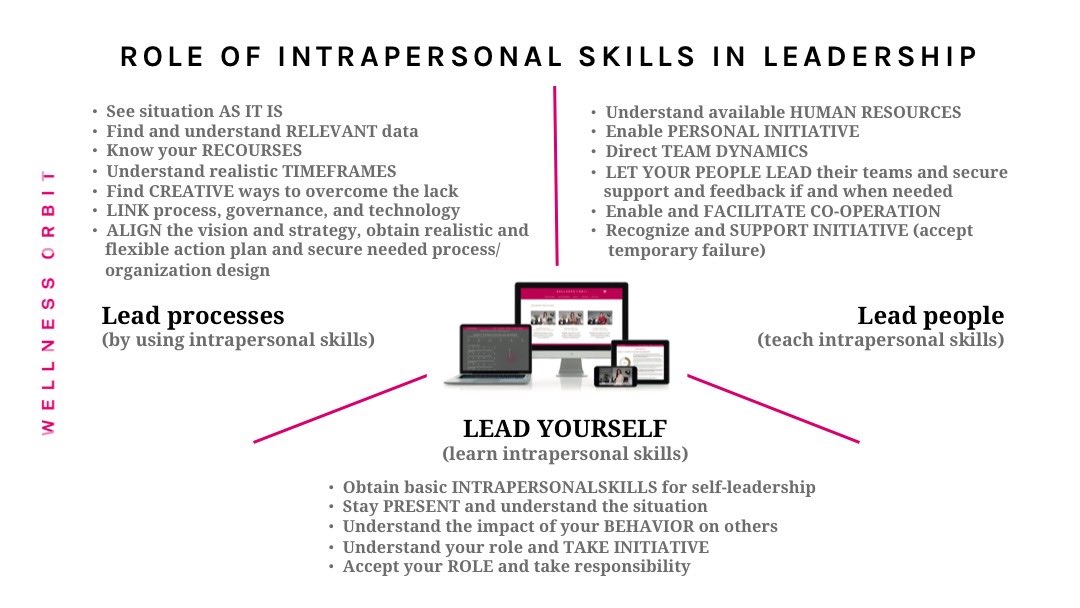Intrapersonal and interpersonal skills are two essential aspects of human behavior that play a crucial role in personal and professional success.
On a general level, intrapersonal skills refer to the ability to understand oneself, manage emotions, and stay motivated. On a deeper level, there are awareness-based intrapersonal skills that can support focus, boost personal initiative and allow insights and creativity to appear. Intrapersonal skills in that sense support innovation and also good interpersonal relations.
It isn't intrapersonal vs interpersonal, it is about excellent intrapersonal skills that support interpersonal skills and overall workplace wellness.
Interpersonal skills involve the ability to communicate effectively, establish healthy and meaningful relationships, and work collaboratively with others.
Both skill sets are important in various contexts, including the workplace, where they can affect employee engagement and productivity.
On this webpage, we explore intrapersonal skills and demonstrate their connection to mental health, stress reduction, burnout prevention, and employee engagement and productivity in depth. Wellness Orbit is founded to give you the best resources to train intrapersonal skills and secure inner wellness.
The essence of intrapersonal and interpersonal skills
Intrapersonal skills are those that involve self-reflection and self-awareness.
Intrapersonal skills are essential for personal growth and development and help individuals understand their strengths and weaknesses, set goals, and lead their thoughts and emotions at will.
Intrapersonal skills support self-reflection, self-awareness, self-regulation, self-motivation, and personal initiative and support both goal-setting and purposeful action.
Individuals with formidable intrapersonal skills are more likely to be resilient in the face of challenges.
Resilient people have a positive outlook on life and feel a sense of purpose and fulfillment. So both leaders and employees need intrapersonal skills to secure both individual and organizational resilience. The title here matters less than actually possessing great self-leadership skills (see the graph below).

Interpersonal skills, on the other hand, are significant in developing relationships, collaborating with others, and resolving conflicts. Examples of interpersonal skills include the ability to listen, well-focused and precise communication, empathy, teamwork, and conflict resolution.
Both excellent intrapersonal and interpersonal skills are needed
An individual's intrapersonal skills can affect interpersonal skills. Individuals with efficient intrapersonal skills are self-leading and capable of building good relationships, working effectively in teams, and resolving conflicts peacefully. So, intrapersonal skills support good interpersonal skills.
For example, a person with low self-awareness and self-esteem may struggle to communicate effectively with others because they lack an understanding of their own emotions and motivations. Similarly, a person who is unable to communicate effectively may struggle to formulate thoughts into constructive sentences and present them calm-mindedly.
Lack of intrapersonal skills leads to miscommunication and toxic work relations as words come out wrong and emotional conflicts thus may appear. So, bad intrapersonal skills mess up interpersonal relations.
Good interpersonal skills allow mistakes and failures and are supportive. When people have no inner mental and emotional turmoils, listening and forgiving becomes easy. This enables us to improve work culture and focus on solutions instead of seeing problems.
Focusing on solutions and not being stuck on old problems is the key to success.
Excellent mind health is the key to success
Excellent mind health is essential for developing and maintaining strong intrapersonal and interpersonal skills.
Mental wellness is characterized by the ability to cope with stress, maintain constructive relationships, and enjoy life. Poor mental health, on the other hand, can lead to negative emotions such as anxiety, depression, and burnout, which then directly affect an individual's work results and interpersonal skills.
Stress reduction and burnout prevention are also essential for maintaining good mind health.
For example, excessive stress often leads to burnout. Most of the burnout happens through positive stress as enthusiasm doesn't leave room for breaks and rest. The late burnout phases are leading to decreased productivity and engagement at work. Strategies for reducing stress and preventing burnout should include systematic mind health training and setting healthy boundaries.
Seeing good work results demands excellent intrapersonal skills
Employee engagement and productivity are closely linked to both excellent intra- and interpersonal skills. Engaged employees are committed to their work, feel connected to their colleagues and are more likely to be productive, creative, and committed to their work.
Knowing how to stay individually motivated and take initiative will, in turn, lead to increased job satisfaction and organizational success.
Effective communication and collaboration are essential for building a positive workplace culture and increasing employee engagement and productivity.
Only when employees have strong intrapersonal skills, they can work effectively and resolve conflicts in a calm-minded manner.
Having good intrapersonal skills leads to building good interpersonal relationships with colleagues and customers.
Organizations can support their employees' intrapersonal skills, as well as secure excellent mind health by providing stress reduction and burnout prevention training. Supporting mind health and mental wellness builds a healthy and sustainable workplace culture.
|
By investing in intrapersonal skills training leaders can see improved employee engagement and productivity, leading to greater success and fulfillment for both individuals and the organization as a whole.
Conclusion
Intrapersonal and interpersonal skills are both critical components of human behavior that impact personal and professional success.
Strong intrapersonal skills help individuals understand themselves, manage emotions, lead thoughts and set goals, while strong interpersonal skills enable effective communication, collaboration, and relationship-building with others.
Mind health training, stress reduction and burnout prevention are crucial for maintaining strong interpersonal relations. Remember, it isn't intra vs interpersonal skills, both skill sets are needed in pairs to support employee engagement and productivity and lead to a strong and sustainable workplace culture.
By investing in intrapersonal skills training, leaders can foster a positive and productive work environment that benefits both individuals and the workplace as a whole.





